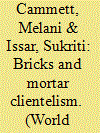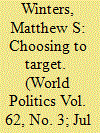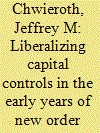|
|
|
Sort Order |
|
|
|
Items / Page
|
|
|
|
|
|
|
| Srl | Item |
| 1 |
ID:
097900


|
|
|
|
|
| Publication |
2010.
|
| Summary/Abstract |
In plural societies, social welfare can be a terrain of political contestation, particularly when public welfare functions are underdeveloped and ethnic or religious groups provide basic social services. It is well established that such organizations favor in-group members, but under what conditions do they serve out-group communities? To address this question, the authors compare the welfare programs of the predominantly Sunni Muslim Future Movement and the Shia Muslim Hezbollah in Lebanon. Although they operate under the same institutional rules and economic contexts and boast the largest welfare programs in their respective communities, the Future Movement aims to serve a broader array of beneficiaries, including non-Sunnis, whereas Hezbollah focuses more exclusively on Shia communities. Based on analyses of an original data set of the spatial locations of welfare agencies, qualitative data from interviews with providers and beneficiaries, and case studies of areas where the two parties established and did not establish welfare agencies, the authors argue that distinct political mobilization strategies-whether electoral or nonelectoral-explain different patterns of service delivery across the two organizations.
|
|
|
|
|
|
|
|
|
|
|
|
|
|
|
|
| 2 |
ID:
097903


|
|
|
|
|
| Publication |
2010.
|
| Summary/Abstract |
Well-governed countries are more likely to make use of foreign aid for the purposes of economic development and poverty alleviation. Therefore, if aid agencies are providing funds for the sake of development, these countries should receive more aid and categorically different types of aid as compared with poorly governed countries. In poorly governed countries aid should be given in forms that allow for less discretion. Using an original data set of all World Bank projects from 1996 to 2002, the author distinguishes programmatic projects from investment projects and national from subnational investment projects. If the World Bank allows more discretion in well-governed countries, then it will choose to provide programmatic and national aid for these recipients. The author presents evidence that the World Bank provides a larger proportion of national investment lending in better-governed countries. With regard to programmatic lending, he finds find mixed evidence. Among counties eligible for International Development Association (ida) aid, good governance surprisingly is associated with a lower proportion of programmatic aid, whereas for International Bank for Reconstruction and Development (ibrd) borrowers, good governance is associated with a higher proportion. The author subjects these results to a number of robustness checks. Although he confirms the existing result in the literature that the World Bank provides larger overall amounts of aid to better-governed countries, his examination of the disaggregated data leads to questioning whether both lending wings of the World Bank are designing aid programs in the most prodevelopment way possible.
|
|
|
|
|
|
|
|
|
|
|
|
|
|
|
|
| 3 |
ID:
097909


|
|
|
|
|
| Publication |
2010.
|
| Summary/Abstract |
How do crises lead to change? Rationalist approaches to the question that emphasize inexorable structural responses and the pursuit of distributive preferences by newly dominant coalitions, are inadequate because they obscure the social mediation of material events and the pervasive uncertainty that follows destabilization of the precrisis status quo, which constrains actors from fully grasping their distributive preferences. Until uncertainty is reduced, persuasion emerges as a key mechanism of change. Although constructivist approaches emphasize persuasive practices, they have yet to adequately specify the scope conditions underpinning the selection of new ideas. This article goes beyond much of the constructivist focus on domestic legitimacy and static notions of resonance by emphasizing external credibility and dynamic processes of resonance-building by norm entrepreneurs. The author specifies four features-what he calls the four Cs of crisis resolution-that shape the process of idea selection: carriers, composition, crossover appeal, and credibility. Developing these arguments in the case of the early years of New Order Indonesia, the article suggests that whenever a prominent and cohesive group of advocates promotes an idea that has sufficient ideational and distributive appeal and the endorsement of external actors whose seal of approval is perceived as important, intersubjective belief change, and thus institutional and policy change, is more likely.
|
|
|
|
|
|
|
|
|
|
|
|
|
|
|
|
| 4 |
ID:
097906


|
|
|
|
|
| Publication |
2010.
|
| Summary/Abstract |
Recent explanations of transformations of macroeconomic policy under crisis conditions spotlight the intrinsic properties of ideas and the persuasiveness with which they are marketed. Bridging the divide between power and discourse approaches, this article reveals the causal role played by the power resources of expert ideational entrepreneurs, conditional on the political conjuncture in which they operate. The authors exploit a fortuitous natural experiment from the early 1980s, when the Israeli economy spiraled into hyperinflation. Two similar proposals for economic stabilization and reform were offered by different teams of economists, less than two years apart. While the government rejected the dollarization plan, its authorization of the stabilization plan inaugurated a new political-economic regime. This case, in which similar programs were advocated by different ideational entrepreneurs in a largely stable institutional and economic context, makes it possible to pinpoint why radically new ideas succeed or fail. Previously underutilized analytical tools are employed to conceptualize the power of idea carriers, at both the individual and the group level.
|
|
|
|
|
|
|
|
|
|
|
|
|
|
|
|
|
|
|
|
|